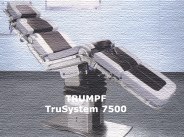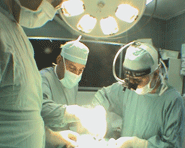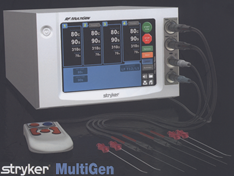 |
|
 | |
Most of the site will reflect the ongoing surgical activity of Prof. Munir Elias MD., PhD. with brief slides and weekly activity. For reference to the academic and theoretical part, you are welcome to visit
neurosurgery.tv |
|
Functional Neurosurgery
functionalneuro.surgery
Functionalneurosurgery.net
IOM Sites
iomonitoring.org
operativemonitoring.com
Neurosurgical Sites
neurosurgery.art
neurosurgery.me
neurosurgery.mx
skullbase.surgery
Neurosurgical Encyclopedia
neurosurgicalencyclopedia.org
Neurooncological Sites
acousticschwannoma.com
craniopharyngiomas.com
ependymomas.com
gliomas.info
gliomas.uk
meningiomas.org
neurooncology.me
pinealomas.com
pituitaryadenomas.com
Neuroanatomical Sites
humanneuroanatomy.com
microneuroanatomy.com
Neuroanesthesia Sites
neuro-anesthessia.org
Neurobiological Sites
humanneurobiology.com
Neurohistopathological
neurorhistopathology.com
Neuro ICU Site
neuroicu.info
Neuroophthalmological
neuroophthalmology.org
Neurophysiological Sites
humanneurophysiology.com
Neuroradiological Sites
neuroradiology.today
NeuroSience Sites
neuro.science
Neurovascular Sites
vascularneurosurgery.com
Personal Sites
cns.clinic
Spine Surgery Sites
spine.surgery
spondylolisthesis.info
paraplegia.today
Stem Cell Therapy Site
neurostemcell.com

Inomed Stockert Neuro N50. A versatile
RF lesion generator and stimulator for
countless applications and many uses

Multigen RF lesion generator .
|  |

| | |
|
24-NOVEMBER-1999 ABDEL-RAZAQ IHAB AL-RAYYAN
6 YEARS HUGE MEDULLOBLASTOMA VERMIAN ORIGIN |
Patient's name: Abdel-Razaq Ihab Al-Rayyan File number: MB
Age: 6 years
Date: 02.12.1999
Address: Amman. Abu-Nsseir. Section :4. Al-Faruji street. Tel.:
5237667 Diagnosis :. Vermian giant medulloblastoma classic type
This is to certify, that the above mentioned patient was admitted to
the hospital 23.11.l999 complaining of vomiting and inability to
walk or set down. The patient was lethargic with ability to move all
limbs upon verbal request. MRI was performed and showed huge
medulloblastoma occupying the posterior fossa. The patient had a
previous picture of breathing disturbances 6 days prior to
admission. Neurologically there was severe cerebellar signs with
horizontal nystagmus when looking to the sides. The vital signs were
acceptable and the breathing pattern is normal. The patient was
observed for any disturbances of the vital signs for several hours
and then was taken to the operation room. Suboccipital approach was
used with the patient patient in the sitting position. A
suboccipital osteoplastic craniotomy with the bone flap still
attached to the ligamentum flavum reflected down to the neck
was performed . Piece meal resection of highly vascular tumor
was performed. The tumor was kissing the floor of the 4th
ventricle , but radical removal of the tumor was achieved.
Postoperative recovery was acceptable and there was
right sided hemiplegia. The hemiplegia started to resolve and the
patient was able to walk the 3d postoperative day. Stitches removed
the 7th postoperative day.
Immediate postoperative and the 4th postoperative day brain
CT-scan were performed and showed the radical removal of the tumor.
Fever was noted all the time and the wound was clean and dry. The
hydrocephalus slightly regressed and the air in the
frontal horns was noted in the investigations. No
meningismus. The histopathology results were those of
medulloblastoma classic type with immunohistochemical analysis
confirming the result. The exam showed cellular small cell tumor
with strong positivity for synaptophysin. It was negative for
cytokeratin, OF AP and NSE. The patient is sent home the 7th
postoperative day. Recommended to continue physiotherapy and to
undergo radiotherapy 2 weeks later. Repeat MRI recommended after
three months
|


Preoperative MRI showing the medulloblastoma and immediate postoperative CT-scan
showing the radical resection of the tumor.
The patient then came 01-August-2006 with new MRI after receiving
course of growth hormone therapy with minimal changes in the
periphery of the resected tumor holding suspicion about recurrence.
It was advised to stop growth hormone therapy , since it could
provoke regrowth, even the dormant resected tumor and sent for PET
studies.
Please for theoretical data concerning medulloblastomas
click here!
|
|
|
|
|  | |